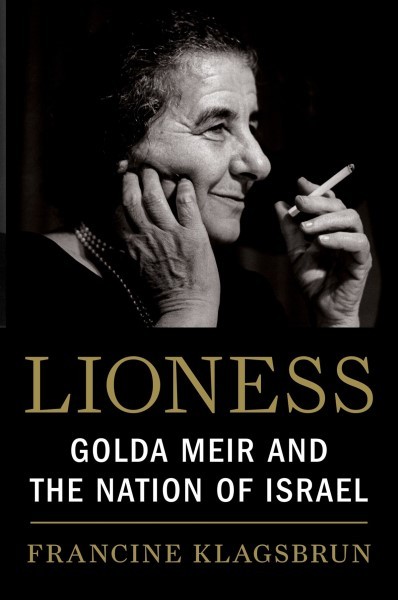Golda Meir’s life, politics still resonate today
“Lioness: Golda Meir and the Nation of Israel,” By Francine Klagsbrun (Schocken 2017)
2017 Jewish Book of the Year award from the Jewish Book Council.
Reviewed by Bettina Berch
With access to close associates as well as to recently declassified American, British and Israeli materials, Francine Klagsbrun has constructed an extraordinary biography of Golda Meir and the state she helped to build. It is well-researched, well-written, and well-edited; there is nothing in this doorstop of a volume that is irrelevant or unnecessary. Where there’s background a non-specialist reader might need, she sketches it in efficiently and keeps going. Even trickier, she strikes the right tone – occasionally critical but always respectful. She acknowledges that Golda, as she is called throughout the volume, took some secrets with her (mostly about her lovers) but does not try to second-guess what might have been said in letters she has not seen nor in conversations she has not heard.
Having opted for a straightforward, chronological approach, Klagsbrun opens with Golda’s roots in Kiev, where threats of pogroms pushed her family, like so many others, to escape to the United States. Golda grew up in Milwaukee, but joined her older sister’s Socialist-Zionist circles in Colorado. The Golda-we-know emerges in 1921, when she and her young husband and her sister’s family set sail for Palestine. Their horrible passage (strikes, deaths, hunger) was only a prelude to the stark realities of life in the yishuv – cramped/communal housing, outdoor plumbing, food shortages, unemployment and the constant threat of violence. For Socialist-Zionist true believers, like Golda and her sister, such difficulties were just part of the package, making them work longer and harder.
Klagsbrun charts Golda’s progress from “new arrival” to political insider, paying attention to turning-point moments – times when she took key positions or sided with particular factions. Golda was instinctively strategic. Apparently, the only time she didn’t follow her gut instinct, when she allowed herself to be convinced that the Yom Kippur War was not imminent, resulted in the only major error she ever thought she’d made.
Hard work and good instincts took Golda most of the way, but her reputation for “straight talk” made her a particularly effective politician. Whether dealing with allies like Ben-Gurion, or foes like Sadat, she spoke her mind and people knew it. If they didn’t like it, that was their problem, not hers. Golda’s bottom line was always clear – the survival of the nation of Israel, for all Jews throughout the world.
For many sixties leftists and second-wave feminists, Golda Meir was no hero. She was close with Nixon and Kissinger. Her American tours were always fundraisers for Israel Bonds or the UJA. She ridiculed hippies and characterized feminists as bra-burners and man-haters.
So how is it, that in 2017, an 800+ page biography of Golda Meir can be an absolutely riveting page-turner? Timing has a lot to do with it. While Middle East politics have changed in the decades since Golda’s death, so many issues she dealt with – the settlements, refugees, terrorism – still shape Israeli life today. And for American readers outraged by the 2016 election, it’s impossible not to wonder if Hillary’s campaign might have been stronger with a healthy dose of Golda-style grit. There’s a lot to think about here, long after the endnotes are over.
BETTINA BERCH is the author of the biography, “From Hester Street to Hollywood: The Life and Work of Anzia Yezierska” and teaches part-time at the Borough of Manhattan Community College. This review was originally published by the Jewish Book Council, jewishbookcouncil.org. It is reprinted with permission.








